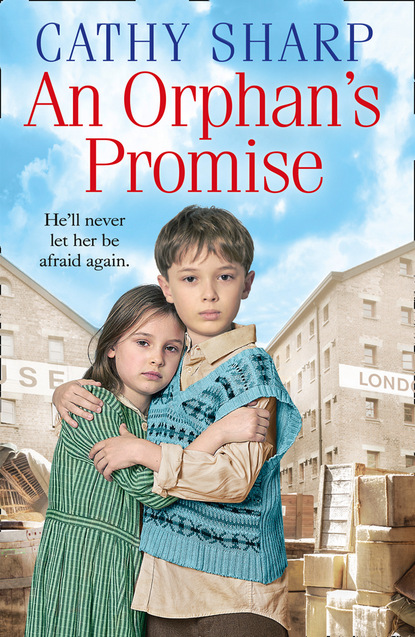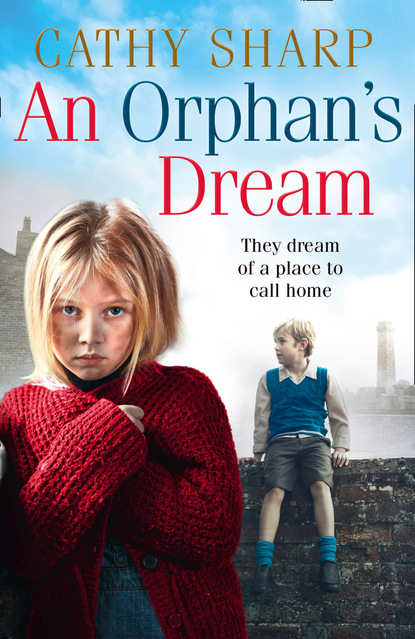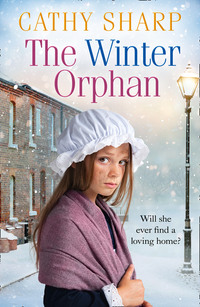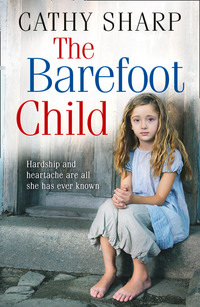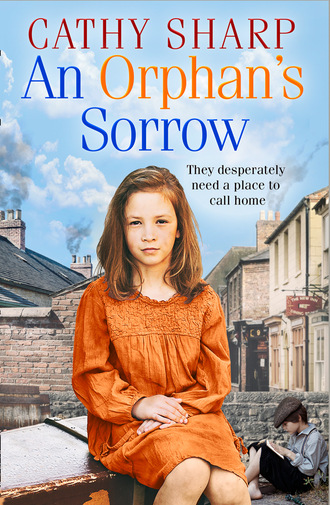
An Orphan’s Sorrow

AN ORPHAN’S SORROW
Cathy Sharp

Copyright
HarperCollinsPublishers Ltd
1 London Bridge Street
London SE1 9GF
www.harpercollins.co.uk
First published in Great Britain by HarperCollinsPublishers 2020
Copyright © Cathy Sharp 2020
Cover [photograph/illustration] © CollaborationJS
Cover design by Claire Ward © HarperCollinsPublishers Ltd 2020
Cathy Sharp asserts the moral right to be identified as the author of this work.
A catalogue copy of this book is available from the British Library.
This novel is entirely a work of fiction. The names, characters and incidents portrayed in it are the work of the author’s imagination. Any resemblance to actual persons, living or dead, events or localities is entirely coincidental.
All rights reserved under International and Pan-American Copyright Conventions. By payment of the required fees, you have been granted the non-exclusive, non-transferable right to access and read the text of this e-book on screen. No part of this text may be reproduced, transmitted, down-loaded, decompiled, reverse engineered, or stored in or introduced into any information storage and retrieval system, in any form or by any means, whether electronic or mechanical, now known or hereinafter invented, without the express written permission of HarperCollins.
Source ISBN: 9780008387648
Ebook Edition © April 2020 ISBN: 9780008387655
Version: 2020-08-13
Contents
Cover
Title Page
Copyright
Prologue
Chapter 1
Chapter 2
Chapter 3
Chapter 4
Chapter 5
Chapter 6
Chapter 7
Chapter 8
Chapter 9
Chapter 10
Chapter 11
Chapter 12
Chapter 13
Chapter 14
Chapter 15
Chapter 16
Chapter 17
Chapter 18
Chapter 19
Chapter 20
Chapter 21
Chapter 22
Chapter 23
Chapter 24
Chapter 25
Chapter 26
Chapter 27
Keep Reading …
About the Author
Also by Cathy Sharp
About the Publisher
PROLOGUE
1937
‘Mummy, please don’t hurt me!’ the child whimpered as her mother caught hold of her arm, strong fingers digging into her flesh as she dragged her along the landing to the top of the dimly lit stairs. ‘I didn’t mean to wet the bed.’
‘Filthy child!’ Her mother’s grip tightened on her arm. ‘I just can’t cope with this, Cassie. With your father gone and me ill it’s time to end it for both of us …’
‘Mummy, you’re frightening me!’ Cassie cried. ‘P-please don’t talk like this …’
‘We’ll go in the river together,’ her mother said, eyes wild with despair. ‘It’s the best for us, Cassie. Your father left us and we’ve no money to pay rent on even these poor rooms. I can’t feed you – or myself …’
They had reached the top of the steep stairs. Cassie clutched at her mother as she started to drag her down them, bumping her against the bannisters so that she stumbled to her knees on the worn carpeting, banging her elbows and head against the knobbly bannisters. She cried out and screamed to her mother to let her go.
‘I don’t want to die, Mummy!’ Cassie wept desperately, pushing at her mother as hard as she could, struggling to break free of the punishing grip. She was terrified of the woman she’d always loved, hardly recognising her in the wild-eyed creature who was tormenting her with threats of death. She jerked one last time, trying to evade the iron grip – and then it happened. Her mother screamed, her body hanging in the balance for one terrible moment before she tumbled backwards down the stairs, dragging Cassie with her. Cassie screamed loudly as her head struck the wooden bannister and then everything went black and she sank into an unconsciousness …
Gradually, through the mists and the pain, over time that she was unaware of passing, the girl heard women talking, women with harsh voices and rough hands that seemed almost to punish as they tended her ills. Her mind whirled with distress as she struggled to remember what had happened. But her head hurt and she couldn’t remember properly, everything was muddled in her mind.
‘Her poor mother broke her neck,’ a woman said in a loud voice on the day the mists cleared for the first time. ‘The police say the neighbours heard shouting and screaming – they think the girl might have pushed her mother.’
‘Cassie pushed her mother down the stairs?’ a second female voice said. ‘Well, I never. I would never have thought it – she looks like such a sweet little girl, so fragile and pretty with that pale hair and those lovely blue eyes …’
‘Well, you never know these things,’ the first voice sighed. ‘Children can be evil little devils you know.’
‘What will they do with her?’
‘I think they’ll put her away somewhere. I mean, she obviously isn’t right in the head since the fall, is she? No doubt she’ll be shut up in an institution where she can’t do any harm – or maybe they’ll send her to Australia like they do all the unwanted kids these days.’
Tears slipped down Cassie’s cheeks. She remembered her name now and her mother shouting at her before she fell … Was it her fault? Cassie didn’t know. All she understood was that no one wanted her, no one loved her and that she was going to be sent away to somewhere she’d never heard of … it terrified her.
The voices were moving away now. Shivering, Cassie slipped out of bed and pulled on the clothes she found folded on a chair beside her. She walked through the long room where other children lay in beds, few of them moving, their eyes just staring. One of the children started screaming and some ladies that Cassie thought might be nurses gathered around her bed, trying to calm her. No one noticed Cassie as she walked out of the room, down the stairs and out of the front door into the street …
CHAPTER 1
Sister Jean Norton shivered in the cool night air, pulling up her coat collar and looking about the street down which she needed to walk every evening after her work was done. It was a wretched place of dirty terraces with broken window frames, paint peeling from them, and gutters choked with filth; and she wished that she did not have to negotiate its length to reach her comfortable little cottage, but the only other way was a mile longer and she was tired after a heavy day’s work at the Lady Rosalie Infirmary in the dockland area of London’s East End, known affectionately to the locals as the Rosie.
In her mid-thirties, dark-haired with grey eyes that were often too serious, she was slim to the point of being thin, and dedicated. Jean loved her work at the Rosie despite the pain and despair she witnessed far too often within its shaded wards. With her record of exemplary nursing, she could, if she wished, apply for a job at a major hospital and expect to be offered it, but she had gone to the Rosie when her life was a living hell and Matron had shown her kindness, respect and given Jean her trust. Even when she was sick of the stink of unwashed bodies, urine and festering ulcers, she would never think of leaving her post.
‘Whatcha, missus!’ the cheeky voice brought Jean out of her reverie as she entered Pail Street, an even dirtier place than the one she’d just left and darker, with only one street light, the others all having been broken by louts throwing stones at the glass. She looked at the dirt-streaked face of the young urchin. By his size, he looked no more than eleven but she knew that he was two years older. She frowned; it was already dark and he should be at home, safe with his mother.
‘Jamie Martin,’ she said, her voice scolding and harsh, even though she did not dislike the lad. ‘What are you doing out at this hour? Your mother will be worrying.’
‘No, she ain’t, she’s stone cold dead,’ Jamie said. ‘Me pa came ’ome drunk and I think ’e ’it ’er on the ’ead and she fell down, dead as a doornail.’ The words sounded brutal except for the underlying hint of fear in his voice and for a moment she wondered if he was lying.
‘Jamie! May God forgive you,’ she said and then, as she looked closer, saw he had been crying. ‘Are you telling me the truth, boy?’
He nodded at her, looking a picture of abject misery. ‘I swear it’s true, missus. I wouldn’t lie to you – not you, missus, ’cos you was kind to me and Arch when Ma was bad afore and yer ’elped Arch …’
‘When did this happen?’ Jean asked, feeling shocked and bewildered. The boy’s tone was as cocky and defiant as always but his face showed his fear and misery.
‘Last night,’ Jamie said and rubbed at his eyes. ‘I heard the old bugger shoutin’ at ’er but I didn’t know she were dead until this mornin’ when I come down and found her on the kitchen floor. She’s white and cold, her face all battered – and Pa’s gone. He’s took his army coat what ’e had in the war and cleared orf. Took his pipe and the money from Ma’s jar on the shelf, too.’
‘Goodness me!’ Jean was shocked to the core. ‘What did you do, child? Have you told anyone else – the doctor?’
‘Nah, he wouldn’t come near,’ Jamie said. ‘Pa threw ’im out last time Ma was sick. Pa called ’im bad names and wouldn’t pay ’im and ’e swore it was the last time he’d set foot in our ’ouse. Marth next door is out and there ain’t no one else what would care; they ’ate me dad.’
Jean nodded, knowing that Ted Martin was what the locals termed a bad lot. Even in these hard times most of the men in the street struggled to find enough work to feed their families and remain honest, but Ted Martin was known for being all kinds of a rogue and even the hardened working men of Pail Street steered clear of him. She realised that Jamie must have hung about the street all day waiting for someone to come he dare approach.
‘Will you take me to her?’ Jean asked, looking at the young boy anxiously.
‘I bin ’anging around waitin’ fer yer,’ Jamie said and sniffed, wiping his dripping nose on his threadbare sleeve. He shuffled his feet, looking both guilty and miserable. ‘I remembered you ’elped Arch when ’e was in trouble wiv the constable and I thought …’
‘Yes, of course I’ll help,’ Jean said instantly, though she feared it must already be too late. If Lizzie Martin had lain all night and all day on a cold floor in weather like this, she wouldn’t stand much chance even if she’d still lived after her husband battered her. Jean took Jamie’s hand and held on to it and he ran with her down the street.
‘If Arch ’ad been ’ere ’e would’ve known what ter do …’ Jamie was anxious, clearly feeling that he ought to have done something sooner.
‘Where is your brother, Jamie?’
‘Went orf ter look fer work down south last month,’ Jamie told her. ‘Said ’e’d come back fer me when ’e was settled – said it weren’t no life fer any of us wiv Pa the way he is – said if Ma had any sense she’d leave ’im …’
Jean nodded. Archie was Lizzie Martin’s eldest son but still only seventeen. When he’d left school to work on the docks at fifteen, he’d been forced to help his father in a robbery where he worked. The police had suspected an inside job and Archie had been questioned. He’d given Jean’s name as a witness to prove he wasn’t on the docks at the time the police said and she had spoken for him, because it was true. Afterwards, when they were alone, she’d made the lad tell her the truth and he’d promised her he hadn’t been involved in the robbery.
‘Pa made me tell him what time the watchman came on and other things,’ he said looking ashamed. ‘He said I had ter be there and help him get inside the warehouse where the stuff was stashed – tins of bully beef, fruit and stuff like that. He hit me so I had to say I would, but then I ran orf and went to the church hall – and that’s where yer saw me. I never done nothin’ bad …’
Ted Martin had been arrested, charged and convicted with stealing a crate of tinned food. He’d been sent to prison for eighteen months and when he came out, he was even more surly and brutal than when he went in if that were possible. He’d beaten his wife and his elder son and Jamie would have got it too if he hadn’t been staying with his nan down the road. She’d been ill then and died a few weeks later, of the shame, Lizzie Martin told her friends.
It hadn’t taken Archie long to decide to move away, Jean thought. His father had been back from prison only four months. Jean wondered why she hadn’t known, but she was on day duty for the moment and it was late when she walked home and she hardly ever said more than good evening to anyone.
They had reached Jamie’s kitchen door. She pushed it open and went in. There was no electric light here, just oil lamps and candles. She groped her way in the almost pitch-black darkness to the table and felt around, but even as she tutted in frustration, a match was struck and a candle flame flared. Jamie knew where his ma kept the candle. He lit a second and Jean saw Lizzie Martin lying on the floor.
It was immediately obvious that she was dead. Her face was a bloody mess and there was a pool of congealed blood under her head where her husband had hit her, time and again. The iron poker used to strike her was lying on the floor by her side. Either Ted Martin had been too drunk or too panicked to try and hide what he’d done and he’d just cleared off with whatever he could lay his hands on.
Jean knelt beside the dead woman, touching her face and closing the terrible staring eyes. She felt tears sting her own as she thought of the wretched life Lizzie Martin had endured for years. Why hadn’t she taken her children and left the drunk who beat her and made all their lives miserable?
It was too late now. Jean looked up at the fearful face of the young lad.
‘I’m sorry, Jamie, she is dead. We can’t help her but we have to get the police and the doctor – it is a formality and I’ll see to it. Can you go next door to Marth for a few minutes while I sort this out? She’ll be back by now. You can come home with me after I’ve sorted this out and I’ll look after you until we find Arch or someone to take you in.’
‘Yeah, all right,’ Jamie said and gave her a frightened stare. His bottom lip was trembling; tears filled his eyes, then trickled down his cheek, and she knew he’d been hoping Lizzie Martin wasn’t really dead and that, as a nurse, Jean could make his mother wake up. Now he knew for certain she was dead and there was no bringing her back and he’d realised he had no one. ‘I’ll be wiv Marth next door. She’ll have me fer a bit …’
Marth Gilbert was a hard-working widow who had given birth to three sons, all of whom were now married with children of their own. She went out scrubbing floors early in the mornings and then went off to help one of her daughters-in-law until the children were in bed. Jean knew the boy would be all right with her until she had this situation under control.
Jean ran down to the telephone box on the corner of Shilling Street, which for once hadn’t been damaged, and rang the police. They told her to wait and they would send a constable round. She rang the doctor next and his wife said he was out but she’d tell him when he got in. Jean told her it was too late for him to do anything in any event and put the phone down. She was angry that no one had been near Lizzie all day, though they must have heard the shouting and screaming the night before – and nor had anyone offered to take Jamie in, even though he must have been loitering outside on this bitter February day. Where was the neighbourly spirit London’s East End was famous for? In this street it didn’t seem to exist, but perhaps times were so hard the folk of the lane had no sympathy to spare for others. Her anger cooled as she returned to the end-of-terrace house more slowly. Most of the women in the lane worked when they could, even if their men had jobs, which many of them didn’t, because there still wasn’t much work going for labourers. Probably the truth was that no one liked the Martin family. Lizzie had had a sharp tongue on her at times, the children had been neglected when their mother was ill and Jamie was cheeky. He hadn’t asked his neighbours for help because the only one kind enough to take him in was Marth.
Marth came scurrying in as soon as Jean got back to the narrow little house, with its parlour, kitchen, lean-to scullery and outside toilet. Upstairs were two bedrooms and a landing. Marth entered through the scullery and went quickly to Lizzie’s prostrate form. She gave a little cry of shock and looked at Jean in dismay.
‘No wonder he didn’t know what ter do! Now what’s to happen to that poor lad?’ she asked. ‘Lizzie wasn’t the best ma to her kids but the boy loved her. I’d ’ave ’im if I were sure Ted Martin had gorn fer good.’
‘I doubt he will come back now,’ Jean said. ‘After this, they will hang him. If you could manage Jamie, Marth, he might be better off here, at least for a while – or I could take him home with me …’ Jean frowned as her mind sought for a better solution.
Lady Rosalie and Matron had combined to help orphaned or abused children find foster parents in the recent past, but she knew there were always more children needing homes than suitable carers to take them in. In Jamie’s case it might be that the authorities would decide to put him in an orphanage outside London – and she couldn’t see that suiting the boy. No, he would be better off in the streets he knew and perhaps his brother would come home and look after him.
‘If he goes ter school I’d be home when he gets back,’ Marth said and nodded. ‘I’m used to boys, Sister Norton. I reckon he would be more trouble ter you, lass.’
‘Well … perhaps we can get some money to help you,’ Jean said uncertainly, because she knew it must be a struggle for Marth to manage on what she earned, but the older woman shook her head.
‘If yer go to them bloody Children’s Welfare lot they’ll take him in the orphanage and like as not he’ll be shifted orf ter Australia or the ends of the earth. Nah, Jamie will be better wiv me and nought said. My boys will see we don’t go short. My Eddie is workin’ fer a builder now, and Ernie is on the ships – and Pete, well, he’s thinkin’ about the army. His wife wants ’im ter stay ’ere but he’s got the itch. Got married too soon, that boy did – told ’im ter be careful but he wouldn’t listen and ended up ’avin’ ter wed that little cat. She got ’er claws in ’im, all right – told ’im she was havin’ his kid and then lost the poor little mite after she’d got my boy tight …’
Jean nodded, only half listening to Marth’s tale of woe. She’d heard all this when Marth had come into the infirmary with a festering toe. Jean had tended it for her but Marth wouldn’t stay in as a patient and so Jean had called on her at home every couple of days for a fortnight until it was better. Jean had visited several of the women in this street over the years she’d worked for the Rosie, but none of them were particularly friendly and she understood why Jamie had waited for her to come home. It was truly a horrible place to live. Jean didn’t like the smell or the atmosphere of the place, but she was a nurse – and when people came to her asking for help, she could not refuse. Her manner was stern and she seldom laughed, other than when with a special friend, but she knew her duty to those in need.
‘Well, if you’re sure,’ she said when Marth had finished her complaining. ‘You know where I am if you need me.’
‘Aye, lass, I know,’ Marth said and grinned. ‘Folk round ’ere reckon as you’re a real sourpuss but I tell ’em they’re wrong. I know you’ve a good heart on yer, Jean Norton, even if yer try ter hide it.’
Something in Marth’s tone made Jean smile despite herself. ‘You are a good woman, Marth Gilbert. You’ve had as hard a life as any round here and yet you always help your neighbours and I’ve never seen you lose your temper.’
‘Oh, I used ter do that when me boys were young,’ Marth chortled. ‘I’ve mellowed in me old age, love. Once they’ve took Lizzie away you get orf ’ome and leave the young ’un to me.’
‘All right – if it’s what you want.’ Jean couldn’t help feeling relieved. The responsibility for a young boy was a lot to take on in her position but she would have done it for a while. ‘Perhaps Archie will come back for him as he promised.’
‘Aye, providing he hasn’t gone orf ter Spain ter fight that foolish civil war. There’s four young lads gone from round ’ere this past week. My Ernie said they was fed up wiv bein’ told there’s no work – and they think it’s romantic.’
‘Until they lose a leg or an eye,’ Jean said grimly.
Although a child then, she vividly remembered the injuries the terrible war with Germany had inflicted on her own family – her father and two uncles killed and Josh … Her mind veered away from the memory of the school friend she’d known who had volunteered when only sixteen and been returned with no legs, a ruined face and blind in one eye. Josh had seen clearly with his one eye and he’d seen the horror she couldn’t hide. She thought it was the reason he’d crawled to his bedroom window and somehow managed to fall through it when his parents slept.
At fourteen years, Jean had been an idealistic child who admired the tall strong lad who, being a neighbour, she talked to nearly every day. He’d volunteered and been taken into the army, even though he was too young, but of course Josh had been a sportsman and looked older. Perhaps it was the realisation that he would never play cricket or football again that had made him take his life, but Jean was sure it was her fault and she’d never forgiven herself. She sometimes thought it was the reason she’d taken up nursing rather than following her hope of being a singer on the stage. It had been a childish dream and children of that terrible war grew up too quickly. The reality of grey-faced men who had been gassed or badly injured had made her dedicate her life to nursing and she sometimes thought that she was trying to heal Josh every time she treated the sick and dying. He’d never been her lover – someone else had broken her heart – but when she was lonely and the doubts crept up on her, it was always Josh’s eyes, accusing her, that she saw in her mind.
Marth departed to get Jamie some supper and Jean covered Lizzie with a coat. It wasn’t long before the police constable arrived and soon after the doctor, who grumbled about being called until he saw Lizzie lying there dead. Jean waited until the undertaker arrived to take Lizzie’s body away and then she went home.
Letting herself into her kitchen, she realised the range was almost out and hurried to bank it up. She needed a cup of tea and her supper and then she might be able to get this chill out of her limbs. It was far from the first time she’d seen a dead body but it had been unpleasant to find Lizzie like that and the police had warned her to be careful; Ted Martin was a vindictive man and might resent her for reporting what his son had said he’d done. Jamie couldn’t bring himself to tell the police but Jean had had no hesitation. Shivering, she scurried about the kitchen preparing her supper of scrambled eggs and mushrooms with toast.
The house seemed empty and lonely and she wished her friend would visit but knew he would not – they met now and then but always in a public place for coffee or a drink, because it was safer. Both of them wanted more but it wouldn’t do because George Bent was married and even though his wife had banished him to the spare room, Jean wasn’t an adulteress and she didn’t want to be the one who destroyed another woman’s home.


